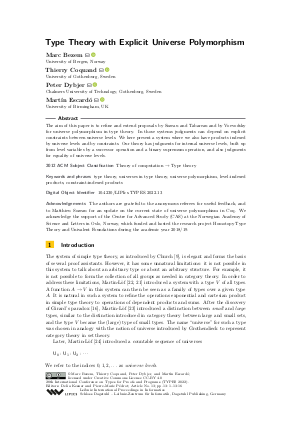@InProceedings{bezem_et_al:LIPIcs.TYPES.2022.13,
author = {Bezem, Marc and Coquand, Thierry and Dybjer, Peter and Escard\'{o}, Mart{\'\i}n},
title = {{Type Theory with Explicit Universe Polymorphism}},
booktitle = {28th International Conference on Types for Proofs and Programs (TYPES 2022)},
pages = {13:1--13:16},
series = {Leibniz International Proceedings in Informatics (LIPIcs)},
ISBN = {978-3-95977-285-3},
ISSN = {1868-8969},
year = {2023},
volume = {269},
editor = {Kesner, Delia and P\'{e}drot, Pierre-Marie},
publisher = {Schloss Dagstuhl -- Leibniz-Zentrum f{\"u}r Informatik},
address = {Dagstuhl, Germany},
URL = {https://drops.dagstuhl.de/entities/document/10.4230/LIPIcs.TYPES.2022.13},
URN = {urn:nbn:de:0030-drops-184564},
doi = {10.4230/LIPIcs.TYPES.2022.13},
annote = {Keywords: type theory, universes in type theory, universe polymorphism, level-indexed products, constraint-indexed products}
}

 Creative Commons Attribution 4.0 International license
Creative Commons Attribution 4.0 International license


















